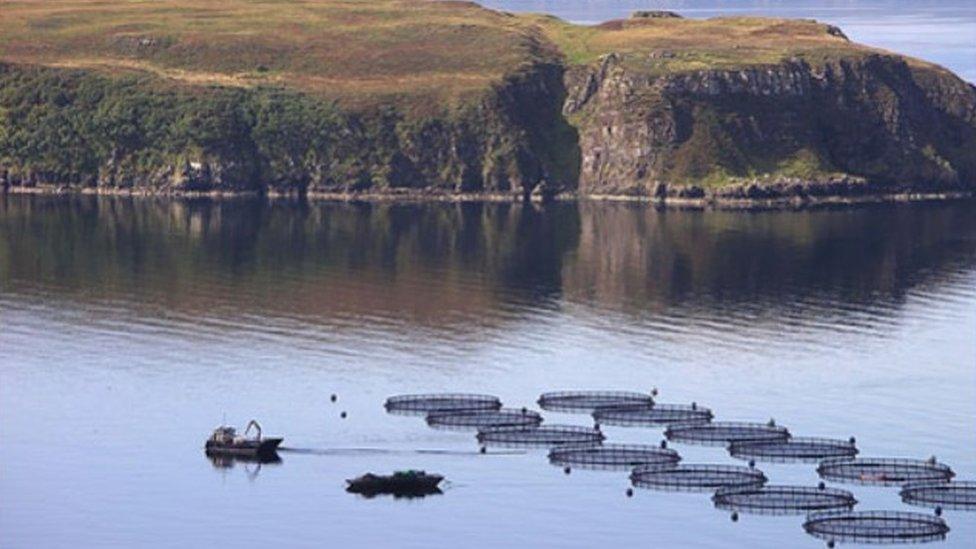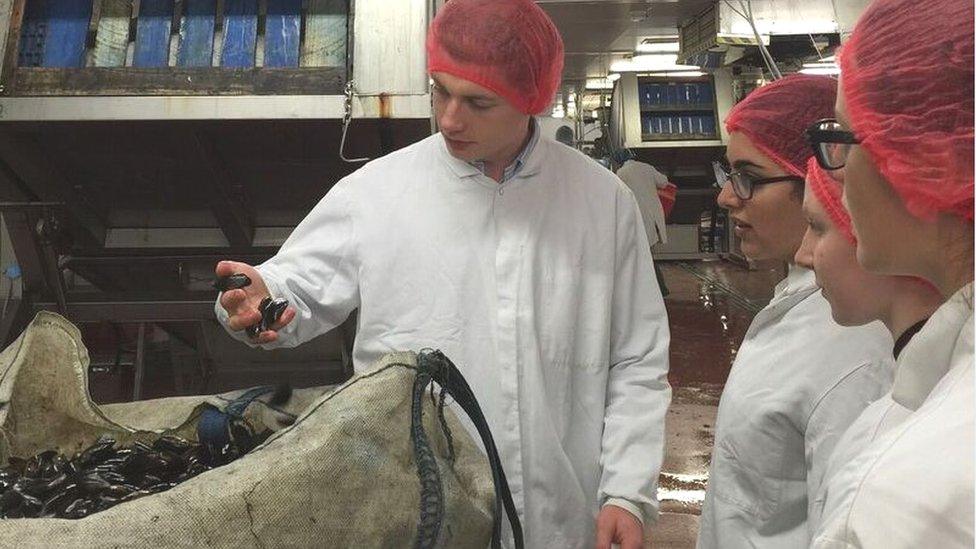New strategy launched to 'double' size of aquaculture
- Published

The strategy predicts an increase in Scottish salmon production to about 350,000 tonnes per year by 2030
A new "roadmap" has been launched in a bid to double the size of Scotland's aquaculture sector within 15 years.
Businesses and organisations involved in the sector are seeking to boost the value of Scottish aquaculture from £1.8bn this year to £3.6bn by 2030.
They estimate this will generate more than 9,000 new jobs for the industry.
A working group has launched a new growth strategy, which identifies key actions that are required to achieve the goals.
The group includes representatives of the Scottish Salmon Producers Organisation, Scottish Aquaculture Innovation Centre, Scotland Food and Drink, Association of Scottish Shellfish Growers and businesses in the sector.
The strategy, which was developed after industry-wide consultation, sets out key recommendations for action by both the industry and government.
They include stripping industry regulator Marine Scotland of its industry development role and passing that remit on to the Scottish government's Food, Drink and Rural Communities Division.
The strategy document also recommends introducing "world-leading innovation sites to trial cutting-edge equipment, technology and fish health strategies".
Another key recommendation - creating a new industry leadership group to drive forward the plans - has already been accepted by the Scottish government.

The strategy also forecasts a big rise in Scottish shellfish production by 2030
Salmon is the largest component of the Scottish aquaculture industry, with about 170,000 tonnes produced on farms each year.
The value of export sales alone is about £450m, making it Scotland's top food export.
The strategy predicts an increase in salmon production to about 350,000 tonnes per year by 2030. It also forecasts that Scottish shellfish production - mostly mussels - will rise from about 8,000 tonnes per year to 21,000 tonnes.
According to Scottish government figures, 8,800 jobs are currently supported by the aquaculture sector in Scotland. The new strategy estimates that number could rise to 18,000 by 2030.
'Roadmap to 2030'
Stewart Graham, co-chair of the working group, said: "This new strategy reflects the industry's ambition to drive sustainable growth and for Scotland to be a world leader in aquaculture.
"We have developed a roadmap to 2030 which can make a transformational impact on Scotland's economy and our rural communities.
"However, the real work begins now and we want to forge a new partnership between the industry, government and its agencies to unlock the full potential of sustainably farming Scotland's seas."
He added: "The strategy must act a catalyst to drive growth throughout the aquaculture supply chain through innovation, skills development and investment, and by ensuring we have proportionate and enabling regulation which balances economic growth and environmental sustainability."
Economy Secretary Fergus Ewing welcomed the report. The launch coincided with the Scottish government's Finfish Summit being held in Fort William.
He described the report as "a strong signal of business confidence", adding: "Aquaculture is one of our real economic success stories of recent years, with the industry on track to grow to a value of well over £2bn annually to the Scottish economy by 2020, supporting 10,000 jobs.
"The Scottish government will now work with the industry to consider their detailed proposals and I have agreed to establish an industry leadership group to help take that forward."